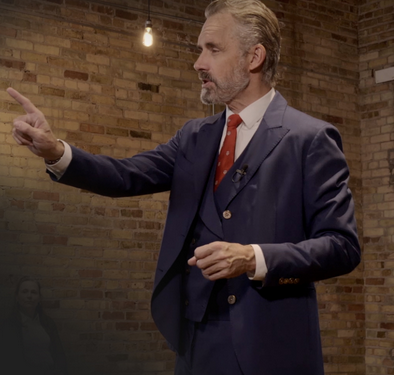
\nDISCOVERING PERSONALITY
WITH DR. JORDAN B. PETERSON
\nAn 8-module personality course taught by renowned psychologist and bestselling author Dr. Jordan B. Peterson, aimed at helping you understand yourself and others based on the “Big Five” model of personality.
\n
\n
\n 8 Video lectures, with audio versions
8 Video lectures, with audio versions
\nThis five-hour, densely-packed course features a combination of theory and narrative, covering the breadth of a full-length university course taught by Dr. Peterson
\n\n
\n Understand Myself license
Understand Myself license
\nAccess to Dr. Peterson’s scientifically-backed personality assessment will allow you to have a more personalized and relevant experience with the course material. Or, you can gift it to a friend!
\n\n
\n Supporting materials
Supporting materials
\nThe lectures will be accompanied by written summaries with key takeaways, as well as references, additional reading material and full time-stamped transcripts available to facilitate learning.
\n\n Members-only discussion group
Members-only discussion group
\nAn exclusive community for members to discuss the lectures and the topic of personality.
\nAbout Dr. Peterson
\nDr. Jordan B. Peterson is a professor of psychology at the University of Toronto, a clinical psychologist and the author of the multi-million copy bestseller 12 Rules for Life: An Antidote to Chaos, the #1 nonfiction book of 2018 in North America, Europe, Australia, and New Zealand. It has been published in over 50 languages and has received worldwide acclaim.
\nWhy learn about personality?
\nEvery day, you have to interact with yourself as well as other people in your family, work, and romantic relationships. Each of them has a unique personality.
\nPeople are different, and it can be challenging to understand other perspectives because you see the world through the lens of your own particular personality.
\nAlthough personality differences can be frustrating, they are important. Each personality type is evolved to solve a different kind of problem. Humans cooperate in societies by solving many kinds of problems together, through these diverse personality types.
\nThrough this course, you can learn to understand yourself and others better, and to more effectively cooperate with other people.
\nWho should take this course?
\nAnyone who is interested in improving their understanding of themselves or their ability to work with other people will find the information presented in this course incredibly valuable and practical.
\nThis 5-hour, densely-packed course features a balanced combination of theory and narrative. It has been designed for those looking to learn about personality without spending tens of hours on research. It is easy to follow and appropriate for anyone interested in the subject, but it is still intellectually challenging. No prerequisite knowledge is required.
\nWhat People Say About The Course
\n
\n
What is the Big Five Personality Model?
\nThis course is based on the Big Five Personality Model. The Big Five personality traits, also known as the five-factor model (FFM), or by the mnemonic “OCEAN”, is a taxonomy for personality traits. Scientists developed the five-factor model following statistical analysis of the language people use to describe other people. They found that personality adjectives tended to clump into five major categories. The five-factor model emerged from this, and it includes the following traits:
\n\n
How will this course help you?\n
\nDiscover the implicit strengths and weaknesses in your personality and how they can be leveraged to thrive in the world.
Improve your ability to deal with and understand those around you who have different personalities.
Understand how negative emotion relates to personality, how your personality can predispose you to disorders such as depression and anxiety, and what you can do to mitigate it.
\n Understand the gender differences in personality, and the sociological, political, and economic ramifications of these differences.
Understand the gender differences in personality, and the sociological, political, and economic ramifications of these differences.
Learn valuable insights that can improve many aspects of your life from your work to your personal development, career, relationships and parenthood.
\n\n
Course Modules:\n
\nIntroductory Lecture
\nThe introductory lecture is an interview with Dr. Peterson discussing the big picture behind the course and its origins. These lectures are the result of years of research, thought, debate, and intellectual refinement. He also speaks about what you will learn in the course and why it is valuable in the present day.
\n“You spend a tremendous amount of your time engaging with other people. You need to understand what they’re like, and you need to understand what you’re like. People are actually quite different. If you know what the differences are, that means you can cooperate with them better, and compete with them better, and all of that’s positive.”
\n
\n
lecture 1
\nThis lecture introduces the philosophical and psychological underpinnings of personality theory and why you should learn about personality.
\nDr. Peterson argues that personalities are evolved solutions to the problem of a highly complex world. Our personalities are the filters of our perception, cognition, and motivation influencing our actions in the world.
\n
lecture 2
\nThis lecture introduces the five-factor model, which will form the basis of the course.
\n“The concept of grit, for example, is essentially the same as conscientiousness, meaning it doesn’t measure anything you can’t get from conscientiousness. The concept of self-esteem is positive emotion (extraversion) minus negative emotion (neuroticism).”
\n
lecture 3
\nLearn about the first of the Big Five personality traits: Extraversion. Extraversion is responsible for our positive emotions.
\nOur positive and negative emotional systems tell us how happy we should be if things are going well and how upset we should be when things are going wrong.
\n
lecture 4
\nThis lecture introduces the personality dimension of neuroticism, which describes a person’s tendency to experience negative emotion.
\nDr. Peterson discusses the consequences of excessive negative emotion, how negative emotion manifests in childhood, and strategies for overcoming depression and anxiety.
\n
lecture 5
\nThis lecture is about the personality trait agreeableness. High agreeableness is associated with maternal care, while low agreeableness is linked with competitive behaviour. Is one better than the other?
\n“There is an obvious language bias that makes it sound like being agreeable is better, but there are pronounced advantages and disadvantages to being at any point on the spectrum.”
\n
lecture 6
\nIn this lecture, you will learn about the gender differences in personality, and the sociological, political, and economic ramifications of these differences.
\nYou’ll also learn about the nature-nurture debate as it pertains to gender differences in personality.
\n
lecture 7
\nDiscover how conscientiousness shapes your life and your career and why it’s historically the biggest predictor of modern day success.
\nLearn why conscientious people are more sensitive to disgust and the fascinating sociopolitical ramifications of this association.
\nLearn about the role conscientiousness plays in your career and the business world.
\n
lecture 8
\nLearn about openness to experience, the personality trait related to creativity, curiosity and interest in ideas.
\nYou will also learn about the distribution of IQ, creativity, and openness to experience in the population, and the social implications that follow.
\n
Jordan Peterson – Personality Contains: Videos, PDF’s

